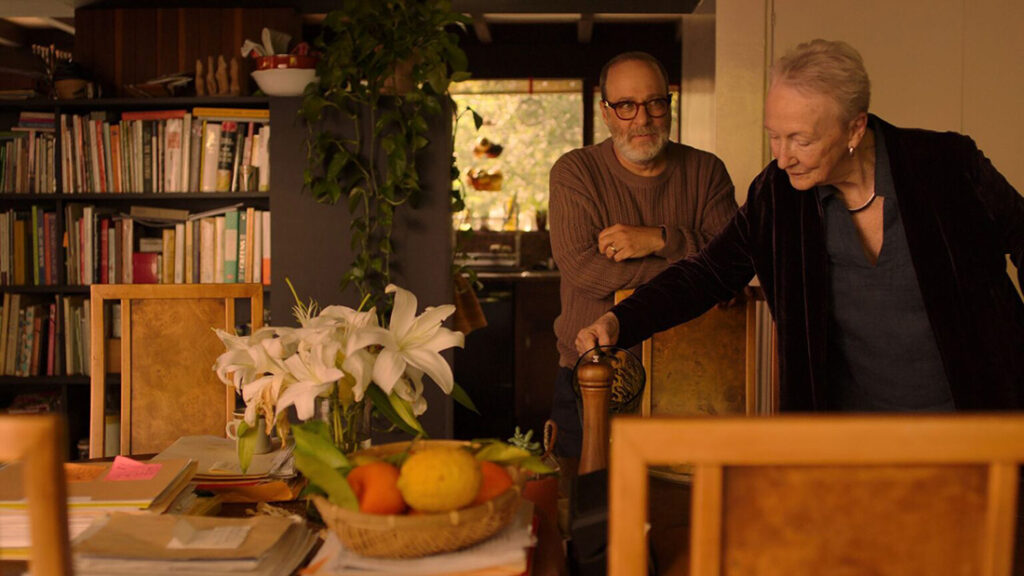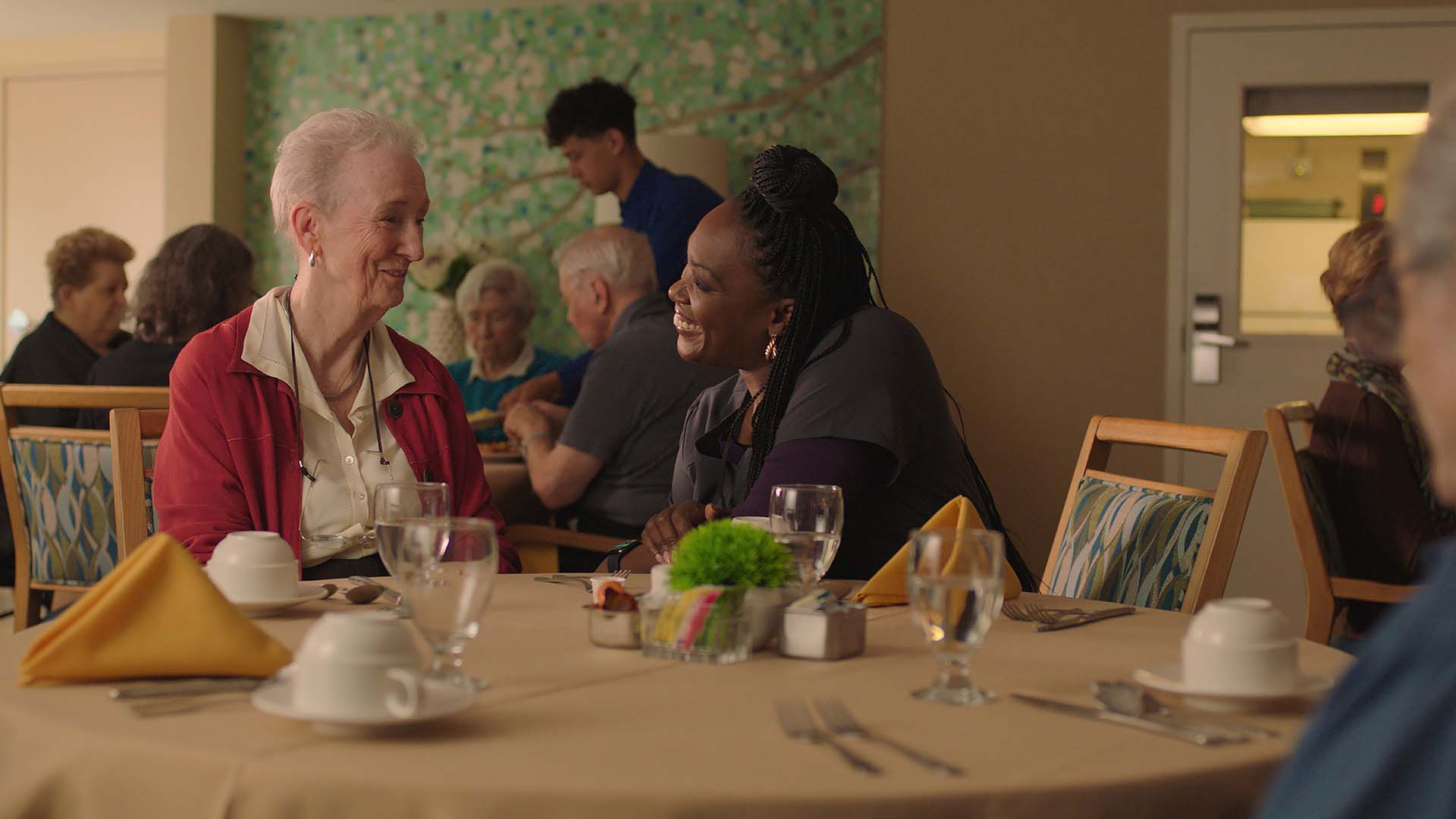
Filmmaker. Caregiver. Teaching artist. Aging advocate.
Sarah Friedland is all of the above. For nearly a decade, she’s blended storytelling, movement, and aging into powerful, unexpected art.
Her debut feature film, “Familiar Touch,” follows Ruth, an older woman adjusting to life in assisted living while navigating early dementia. The film traces her evolving relationships—with her son, caregivers, and fellow residents—capturing the tenderness, tension, and quiet revelations of care and change.
Premiering at the 81st Venice International Film Festival, “Familiar Touch” made a splash—winning the Luigi de Laurentiis Lion of the Future award for best first film, with Sarah named Best Director, and Kathleen Chalfant receiving Best Actress for her stunning portrayal of Ruth.
But what truly sets “Familiar Touch” apart is how it was made—with and by older adults—and what it boldly says about dignity, creativity, and the truth of aging.
Teaching, Caregiving, Creating: A Life Intertwined
Before her breakout as a filmmaker, Sarah spent over three years as a memory care worker, providing home care for New York City artists with dementia.
“That job changed everything I thought I knew about aging,” she said. “There’s so much intimacy, resilience, and creativity that persists—even with cognitive change.”
At the same time, Sarah was deeply immersed in the arts—teaching choreography to filmmakers, filmmaking to dancers, and participating in creative aging trainings through Lifetime Arts, The Creative Center, and SU-CASA. That dual path of caregiving and artistry laid the foundation for “Familiar Touch.”
Cameras, Community, and Creative Control

For Sarah, making this film wasn’t just about telling a story about older adults—it was about making that story with them.
“There wasn’t a version of this film that didn’t include older adults making it with us,” she said. “Anything else would’ve been at odds with what the story was trying to say.”
Sarah and her team partnered with Villa Gardens, a residential assisted living facility in Pasadena, California. In the five weeks leading up to production, they ran a hands-on filmmaking workshop with residents, following Lifetime Arts’ creative aging best practices. Each week focused on a different discipline—screenwriting, cinematography, costume design, acting—and culminated in residents creating their own short films.
“People rotated roles: if you directed one week, you might act the next,” Sarah explained. “By the end, they knew what they were drawn to—and many signed up to work on the feature itself.”
Some residents appeared on screen. Others helped behind the scenes. One sat by the monitor, offering real-time notes on camera framing. “That was her role—and it mattered,” Sarah said. “It was a full production ecology. It was theirs as much as it was ours.”
Flipping the Script on Ageism

This deeply collaborative approach also dismantled ageist myths Sarah has seen time and again in both media and society.
“There’s this myth that older adults can’t handle tech,” she said. “But that’s not about age—it’s about access and support. Once people are shown how, they thrive. Learning to use a camera is no different than learning to use a paintbrush or a kiln.”
That belief shaped both the making and the message of “Familiar Touch.” On screen, the film gently subverts stereotypes. Ruth, the main character, experiences dementia—but she also laughs, creates, connects, and asserts herself. In quiet but powerful scenes, she participates in creative and physical activities that help her re-engage with memory, identity, and joy.
“So many films about dementia are from the perspective of the family member,” Sarah added. “They center grief—understandably—but that can eclipse the person living with dementia. When I was a caregiver, I saw this disconnect. Family members were in deep pain, but the people I cared for didn’t always see themselves in a tragedy.”
“Familiar Touch” insists on a broader, more generous view of aging—one where needing care doesn’t mean losing value, and where older adults are not only seen, but actively shaping the stories being told.
It’s Time to Rethink Aging

At its heart, “Familiar Touch” is about seeing what often goes unseen.
For Sarah, the inspiration came from both personal experience and a deep desire to correct how society—and even loved ones—can overlook the fullness of older adults’ lives.
“I knew my clients intimately,” she said. “But when we’d go out into public space, the world just saw them as ‘cute little old ladies.’ Not as the intelligent, creative, complex people they truly were.”
That disconnect stayed with her. So did memories of her grandmother—a poetry editor, a Plato scholar—who became nonverbal with dementia and was treated as though she had disappeared.
“She was still expressing herself,” Sarah said. “We just didn’t know how to see it.”
With “Familiar Touch,” she hopes to close that gap—to help audiences recognize the people who remain and thrive, even when words or independence fade.
“I want people to leave this film thinking differently about aging. To see it not as disappearance, but transformation,” Sarah said. “There’s still art, still beauty, still becoming.”
Thanks to her work as a teaching artist, a caregiver, and a community-builder, she’s brought others with her—on screen, behind the camera, and into the heart of the frame.
Watch the Film—Then Step Behind the Camera!
“Familiar Touch” opens in theaters on June 20 at Film Forum in New York City, with a wider U.S. and Canada release beginning June 27. Alongside the film’s screenings, Sarah is practicing what she preaches—offering in-person filmmaking workshops hosted in collaboration with local cinemas and community spaces.
To find a screening near you and register for a workshop, visit www.familiartouchfilm.com. Show your support for the film by following @familiartouch and explore more from Sarah at @_motionxpictures on Instagram.
Use code LIFETIMEARTS at checkout for a special discount!
Discount only applies to the first two tickets purchased.
Art Forms
Acting, Dance, Performing Arts, Performing Arts > Film
Audience
Year
Field
Focuses
Accessibility, Advocacy, Arts + Health


